Construction contracts are legally binding documents between two parties outlining the terms and conditions of the working relationship between them, usually awarded after a construction bidding process. In this blog, we’ll explore the components, pros and cons of a cost reimbursement contract.
What Is a Cost Reimbursement Contract?
A cost reimbursement contract is an agreement between parties in a construction project that guarantees the owner reimburses the contractor for costs incurred while they work on the project. Reimbursement, however, is not unlimited. There is a ceiling.
The contractor is not paid solely for the costs but is also guaranteed an additional payment. This additional payment will be the contractor’s profit. The contract will still include an estimate for the total cost of the project.
Unlike a fixed-price contract where the overall price for the project is agreed on before the work starts and the price is final (and thus, the risk lies mostly with the contractor,) the cost reimbursement contract places risk more squarely on the project owner. That doesn’t mean there aren’t other risks, such as scope creep, where requirements are unclear.
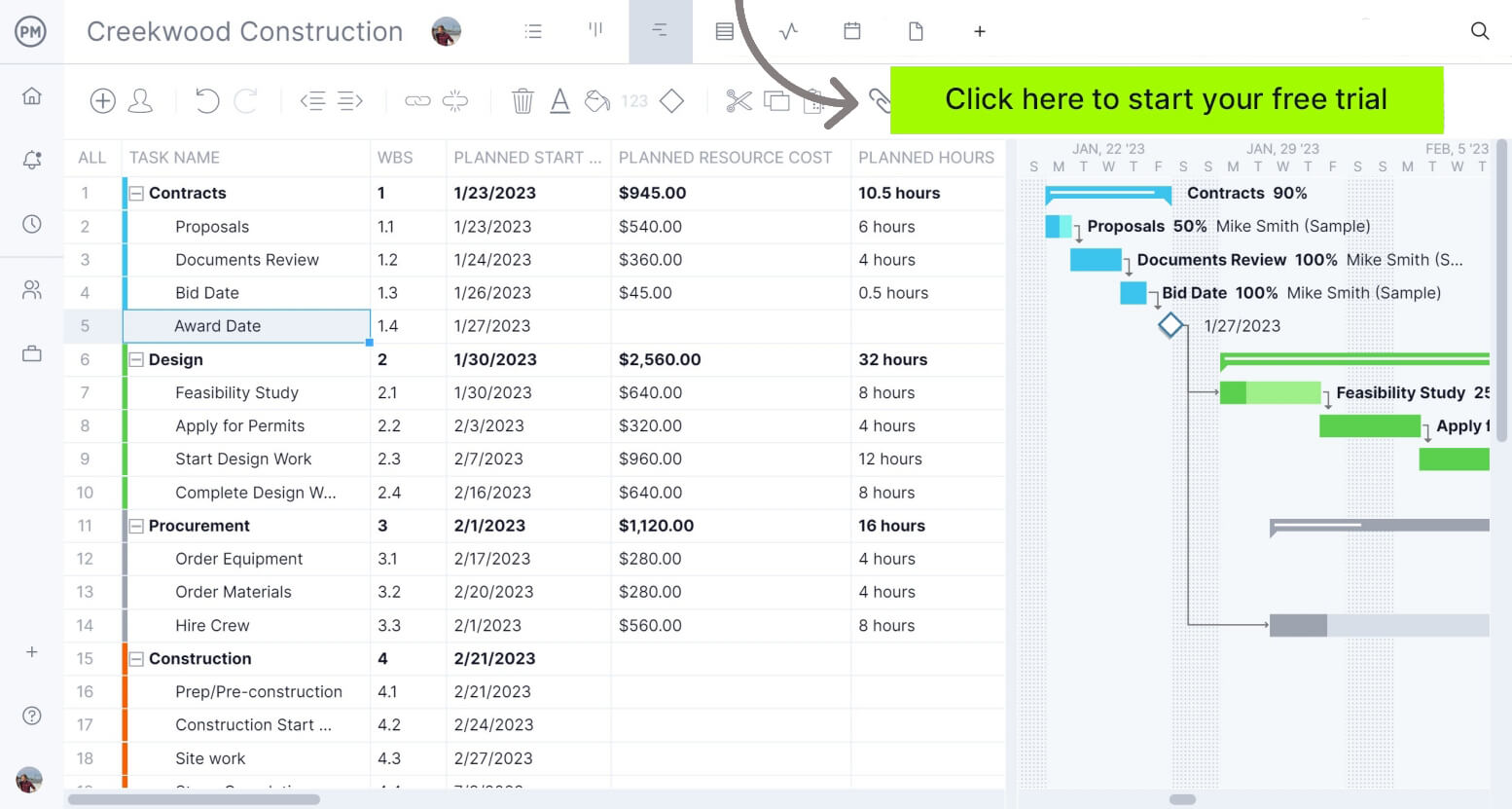
When to Use a Cost Reimbursement Contract
A cost reimbursement contract is particularly beneficial when used in certain scenarios, such as when:
- The project scope is uncertain and changes will likely be made as the project is being executed, such as when executing larger, complex projects.
- The project owner wants to control costs closely and audit the contractor, which is typical for government-funded projects.
- A long-term project is executed, as their costs are hard to forecast in advance.
- The contractors don’t want to assume the risk of a fixed-price contract due to factors that might increase costs beyond their forecasts, such as volatile prices of materials, labor or equipment.
What Should Be Included in a Cost Reimbursement Contract?
Construction contracts must be detailed so the parties involved can clearly understand their obligations. Below are some of the most important components of a cost reimbursement contract.
Parties to the Contract
This section identifies the entities involved in the contract including the buyer (client) who seeks the deliverables and the seller (contractor) responsible for providing them. Clear identification ensures accountability and defines roles to help prevent disputes or misunderstandings during contract execution.
Scope of Work
The scope of work specifies the tasks, deliverables, and responsibilities agreed upon by both parties. It serves as the foundation for performance expectations to ensure both the client and contractor understand the project’s boundaries and objectives.
Type of Cost Reimbursement Contract
This section outlines the nature of the cost reimbursement agreement, specifying whether it is Cost-Plus-Fixed-Fee (CPFF), Cost-Plus-Incentive-Fee (CPIF), or Cost-Plus-Award-Fee (CPAF). It defines how reimbursement and fees are calculated and managed.
Allowable Costs
Allowable costs are those eligible for reimbursement under the contract. This section defines these expenses, such as labor, materials, and overhead and often references guidelines like FAR Part 31 for compliance with standards.
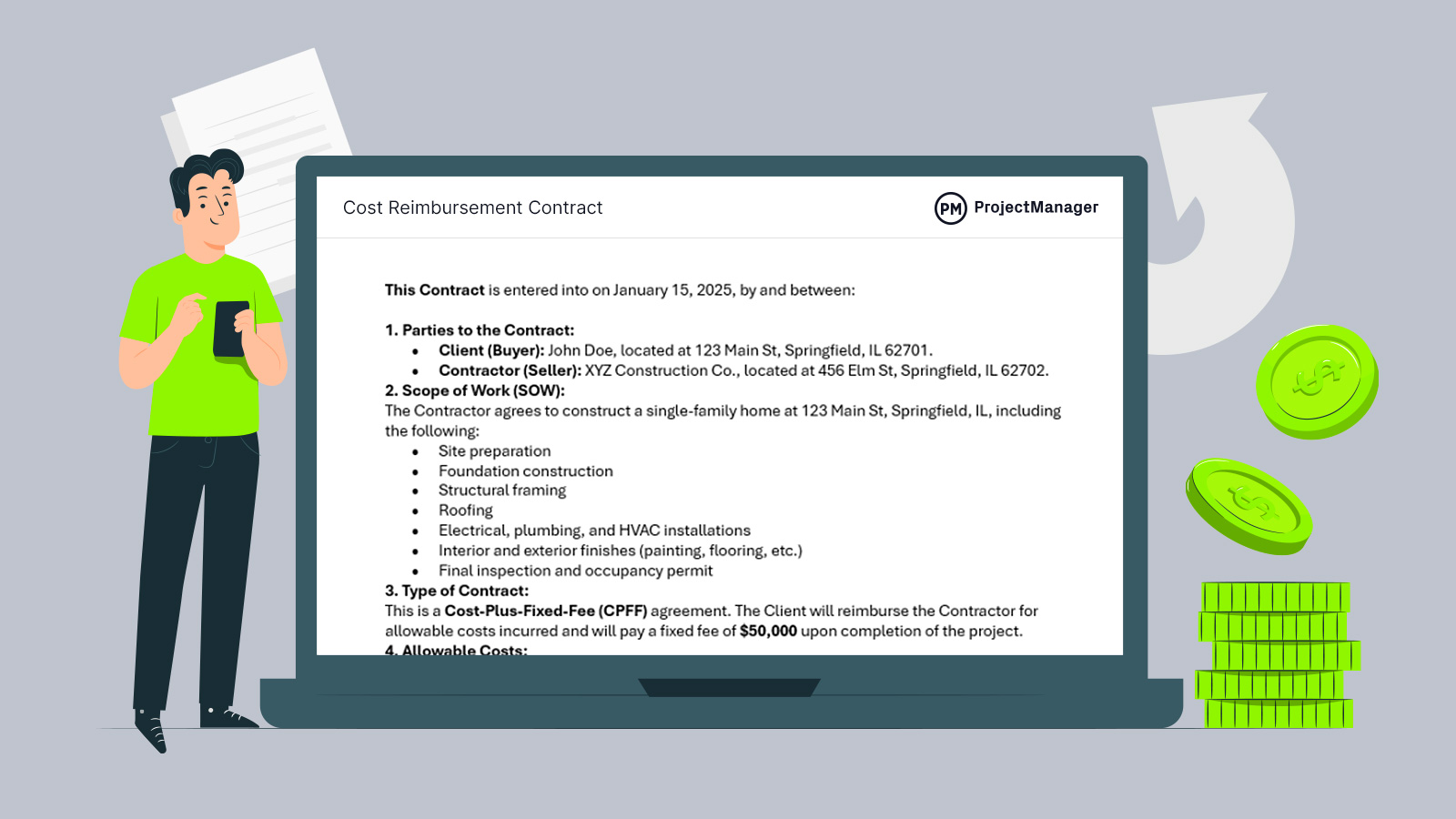
Get your free
Cost Reimbursement Contract
Use this free Cost Reimbursement Contract for Word to manage your projects better.
Payment Terms
This outlines how and when the contractor will be reimbursed, detailing the frequency (e.g., monthly, milestone-based) and the documentation required (e.g., invoices, receipts, reports). The clearer the terms, the smoother the financial transactions.
Fee Structure
The fee structure specifies how profit, incentives or fees are determined. It may include fixed fees or performance-based incentives that align the contractor’s earnings with project success metrics.
Cost Ceiling
A cost ceiling establishes the maximum amount reimbursable under the contract. It prevents unapproved over-expenditure and ensures financial control, requiring the contractor to get approval for exceeding this limit.
Reporting Requirements
Reporting requirements mandate cost tracking, financial reporting and audits. Regular and transparent reporting means the client can monitor expenditures and progress, maintaining accountability throughout the project.
Change Management Process
This section defines the process for controlling changes to the contract’s scope, cost or timeline. Clear procedures reduce disputes and ensure that both parties agree upon and document any adjustments.
Dispute Resolution
Dispute resolution outlines methods for resolving conflicts between the parties, such as arbitration, mediation, or legal proceedings. It provides a structured approach to address disagreements without disrupting the construction project.
Termination Clauses
Termination clauses specify the conditions under which the contract may be ended by either party. They outline the process and consequences of termination to protect the rights and interests of both parties.
Compliance Requirements
Compliance requirements ensure adherence to relevant laws, regulations, and standards. This section helps maintain legal integrity and outlines the obligations contractors must meet to avoid penalties or contract breaches.
Cost Reimbursement Contract Example
To better illustrate what a basic cost reimbursement contract should look like, here’s a cost reimbursement contract example you can download for free. Imagine a scenario where an individual needs to hire a contractor to build a custom single-family home. In this case, the general contractor can execute all of the scope of work without needing to hire any subcontractors. The project owner and contractor have agreed to use a Cost-Plus-Fixed-Fee (CPFF) cost reimbursement contract.
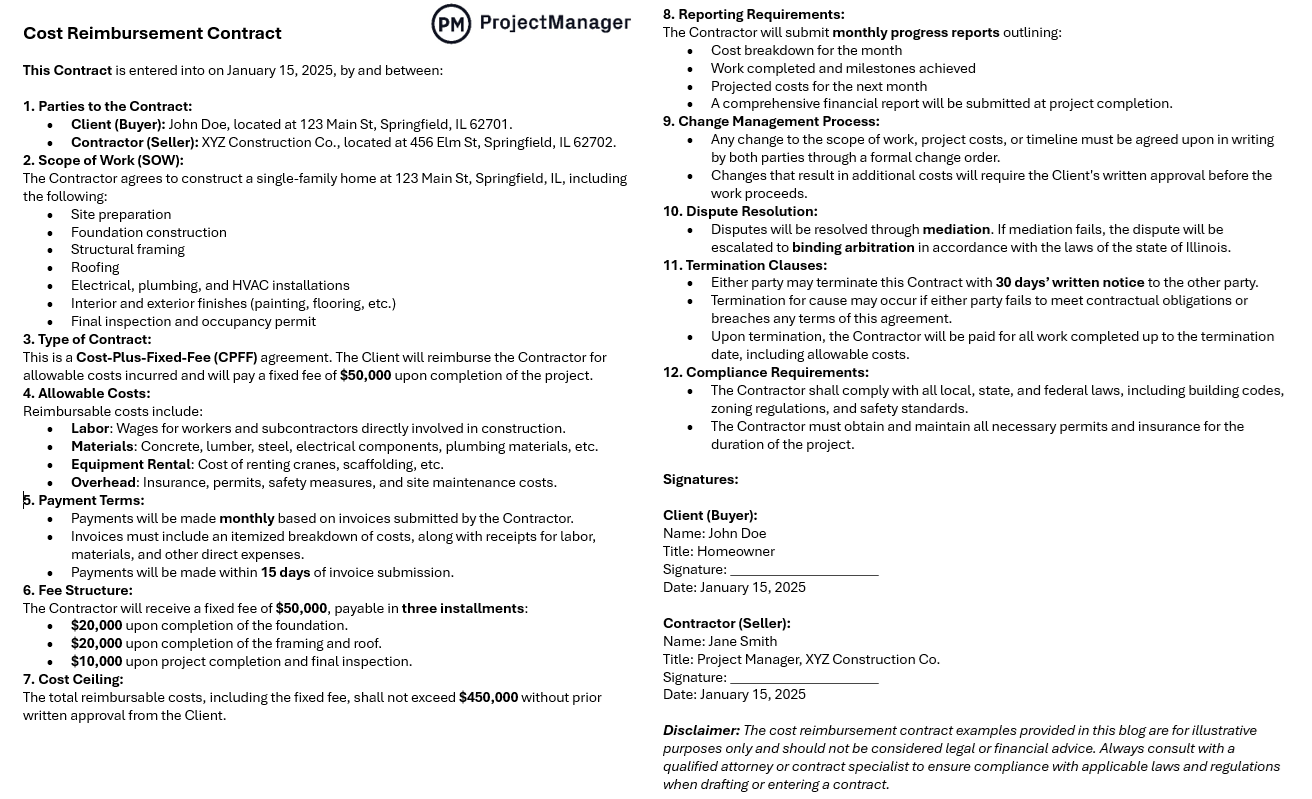
Disclaimer: The cost reimbursement contract examples in this blog are for illustrative purposes only and should not be considered legal or financial advice. Always consult with a qualified attorney or contract specialist to ensure compliance with applicable laws and regulations when drafting or entering into a contract.
What Are the Four Types of Cost Reimbursement Contracts?
There is not a one-size-fits-all cost reimbursement contract. There are actually four distinct categories:
Cost Plus Fixed Fee (CPFF)
A CPFF reimburses the contractor for all incurred costs, plus a fixed fee. This additional fee is included regardless of the contractor’s performance of the project. The customer, then, bears the risk. These contracts are often used in high-risk projects where it might be difficult to get bidders to compete. The incentive is that the contractor is protected from risk.
There are two types of CPFF contracts:
- Completion, in which a goal or product the contractor must deliver to receive their fee is identified
- Term, where the contract specifies a time period and level of effort the contractor must achieve
Cost Plus Incentive Fee (CPIF)
The CPIF gives the contractor a reimbursement for all incurred costs, and then adds an incentive based upon achievement of certain agreed-upon performance objectives, which are defined in the contract. The two parties will agree on a formula to determine what the incentive price is. The risk in this type of contract is with the customer (but less so than with a CPFF,) and the incentive motivates the contractor. Usually, the incentive is a percentage of savings both parties share.
Cost Plus Award Fee (CPAF)
The CPAF gives the contractor an award fee when they meet certain performance metrics outlined in the contract. This type of contract differs from the CPIF because the award is not based on a formula defined in the contract, but instead on the customer’s satisfaction. Therefore, it’s a subjective decision and cannot be appealed by the contractor.
Cost Plus Percentage of Costs (CPPC)
The CPPC awards the contractor all costs for the project and a percentage of those costs. This is not a popular choice with project owners unless they trust the contractor, as it shifts the risk to the owner. There is a risk of costs being artificially increased to profit the contractor. These contracts, therefore, have greater regulations applied to them to avoid such risks.
Pros and Cons of a Cost Reimbursement Contract
A cost reimbursement contract is best for projects where the scope is uncertain and risk is high, as the risk is being shouldered by the customer who pays for all costs. But a cost reimbursement contract is not always the best type of legal course to take between parties.
Here are some of the advantages and disadvantages of using a cost reimbursement contract:
Pros
- Contractors have little incentive to cut corners
- Ideal when quality over costs is the objective
- Final costs are typically lower because there’s no need to inflate prices to cover contractor risk
Cons
- Final costs are not certain
- Needs oversight to make sure only those agreed-upon costs are paid
- Further oversight is needed for making any award or incentive fee fair
- Less incentive for efficiency
There are reasons to use a cost-reimbursement contract over, say, a fixed-price contract, but all contracts have their pros and cons. It’s best to understand the scope and risk of the work to determine which contract is best.
How ProjectManager Helps You With Cost Reimbursement Projects
ProjectManager is award-winning software that allows you to create a budget, keep up with costs and report on those costs. If you use a cost reimbursement contract, you need to have a handle on what you’re spending. The less reimbursement needed, the more likely you’ll receive the incentive award and avoid breaking the price ceiling set up in the contract.
Create Budgets
You can create a budget at any time in the project, though it is most likely this will be done when you are in the planning stages. Your budget, however, can be changed at any time throughout the project’s life cycle. Once set, the project will be displayed on your real-time dashboard and accessible in reports to keep track of your costs.
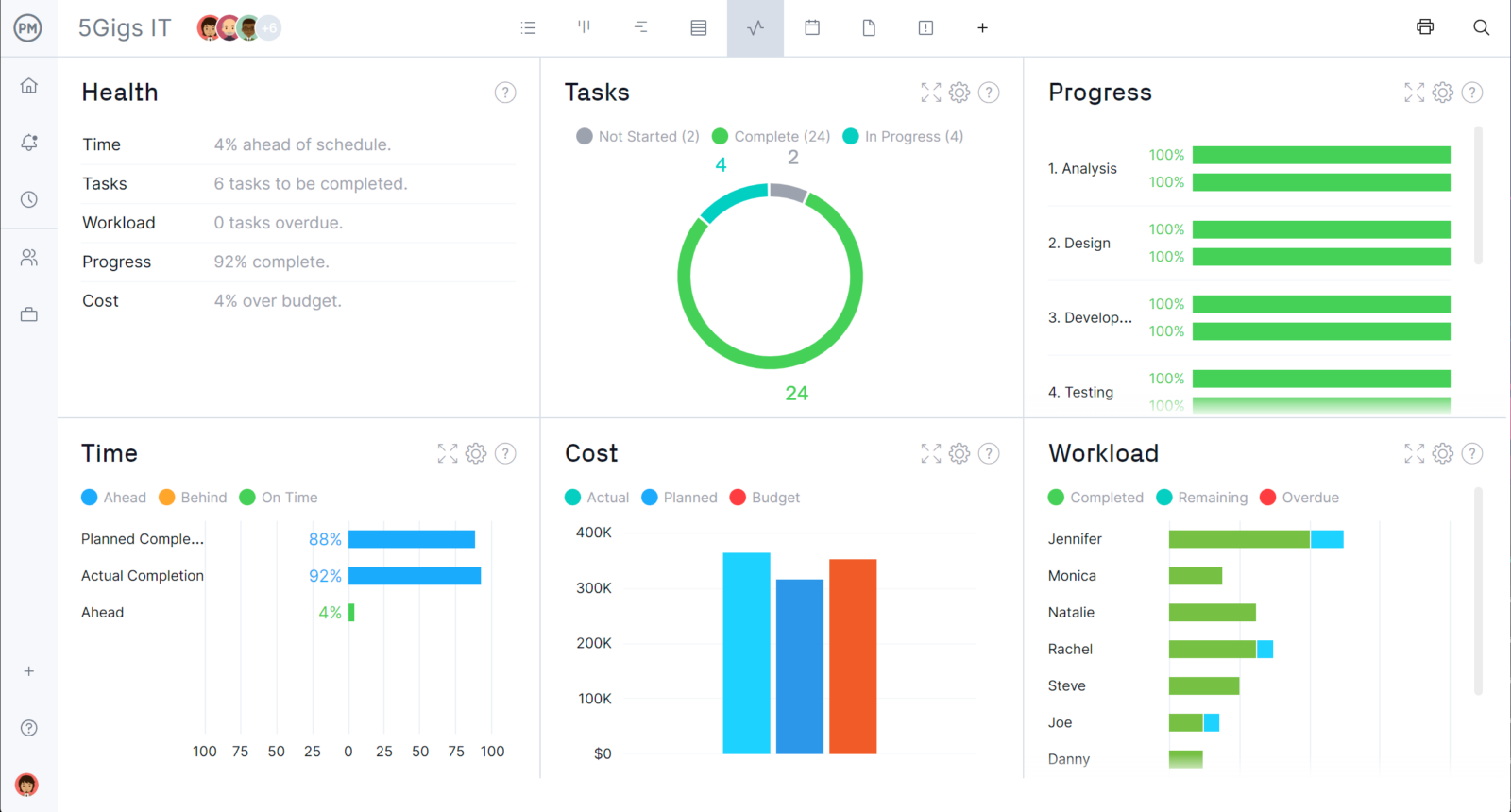
Manage and Track Costs
Manage both types of costs in our tool, both resources and general costs. Resource costs are automatically calculated as your team logs hours on their tasks when you set their hourly rate. This is all shown on the Gantt and sheet view, where you can organize all your tasks and create a schedule by seeing the whole project laid out on a visual timeline.
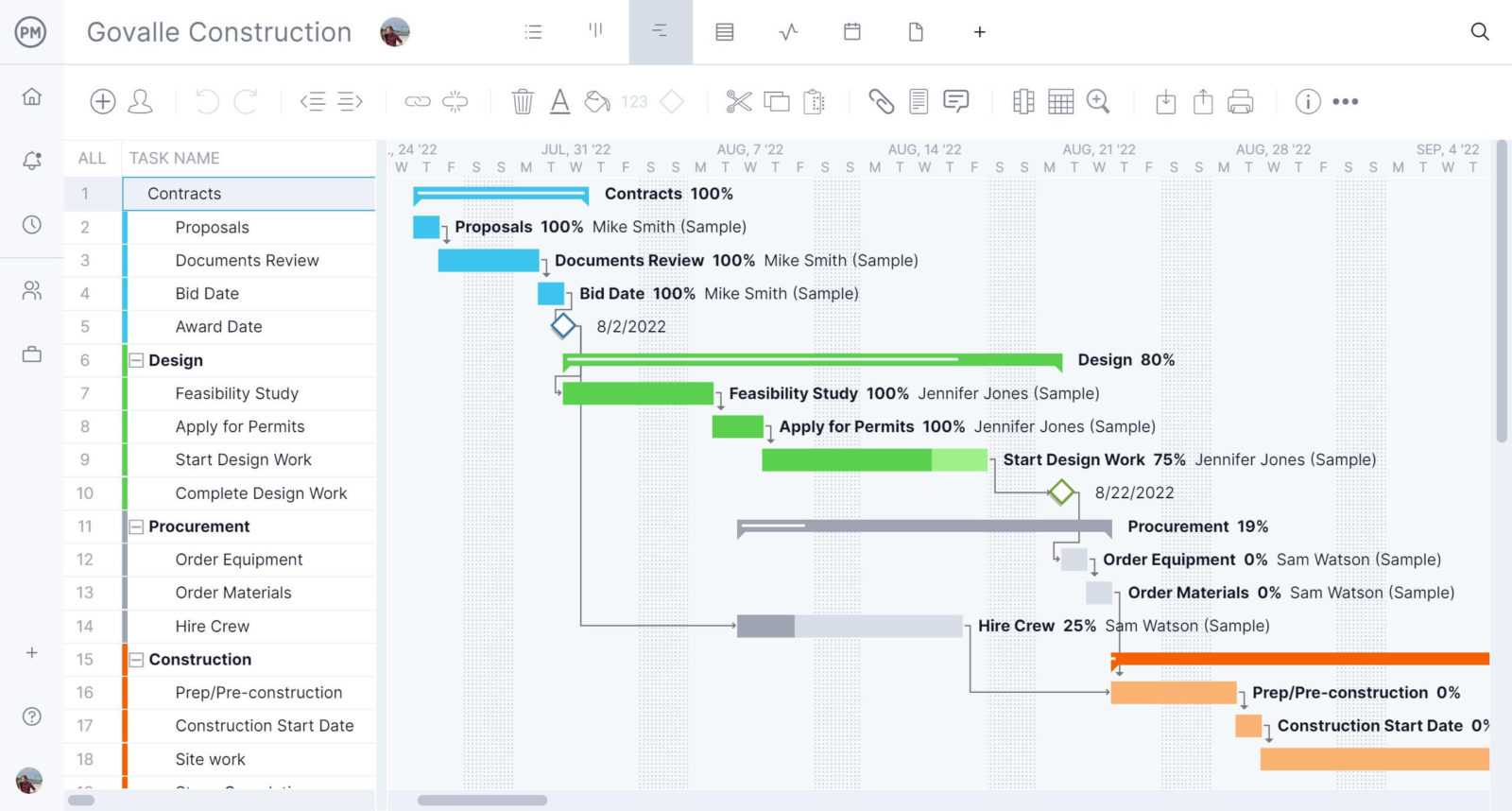
Create Instant Reports
One-click reporting gives you even more data on your costs and budget. You can get this information from reports such as the portfolio status, which is color-coded to easily see if you’re over or under budget. Project status, project plan and task report also give you cost figures. All reports can be filtered to zero in on just what you want to see and then shared to keep stakeholders updated.
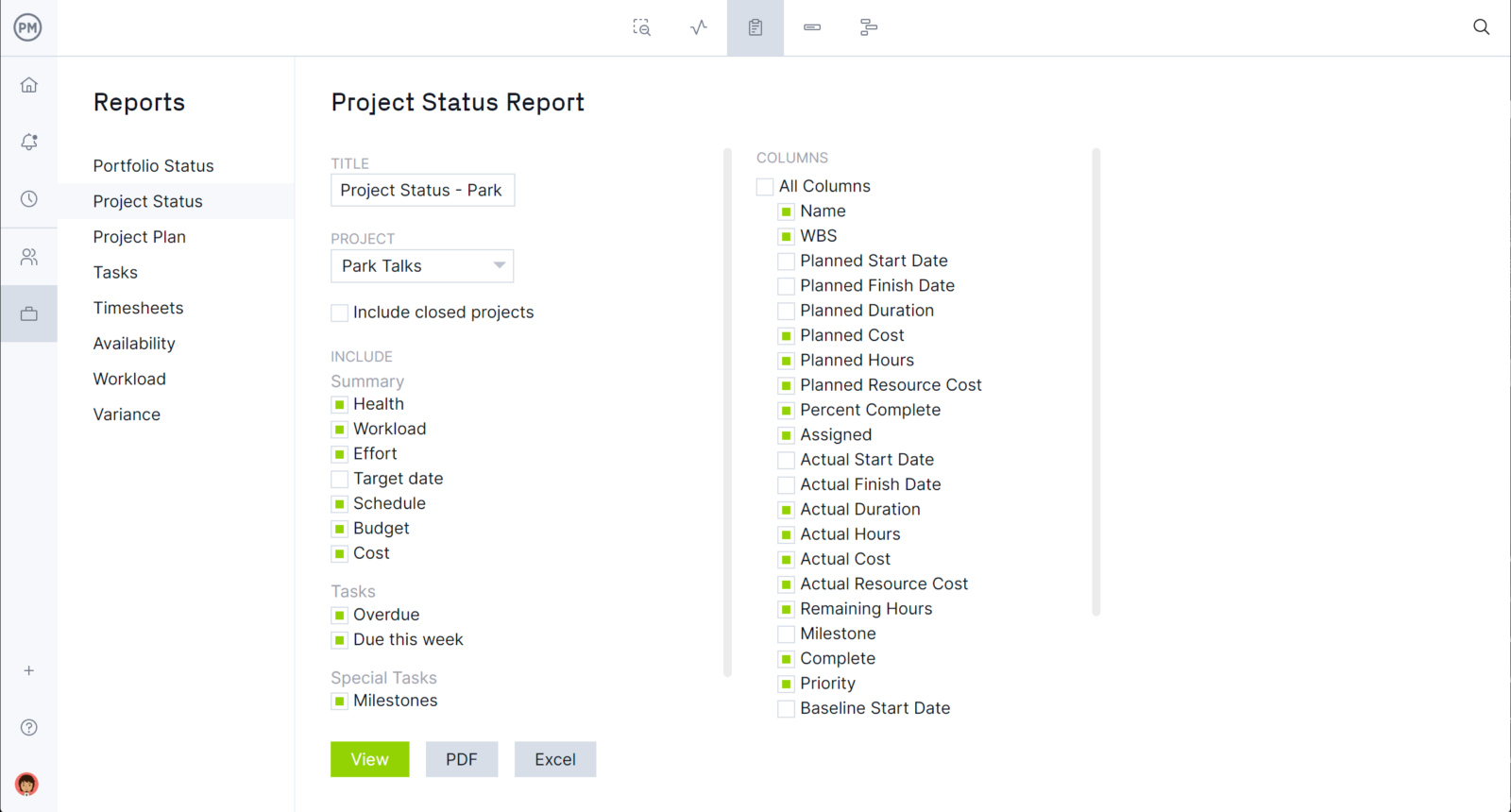
ProjectManager is online software that tracks costs in real-time to help you stay on your budget. Use our tool to manage every phase of your project from planning to closure. Get live data to make better decisions and use our collaborative platform to help everyone work better together. See what we can do to add efficiencies to your project by taking this free 30-day trial today.

